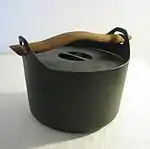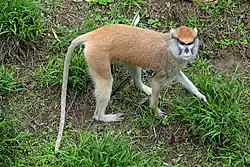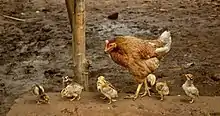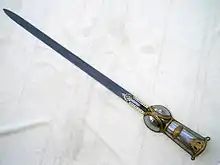pata
Albanian
Etymology
From Proto-Albanian *pat(i)-, from Proto-Indo-European *poti-o- (“to be in possession of”). Cognate to Latin potior (“to have a share in, take possession of”), Ancient Greek πόσις (pósis), Sanskrit पति (páti).[1][2] A suppletive verb, which occurs in the participle and the aorist, as well as in the tenses and moods derived from these stems.
Verb
pata (first-person singular past tense pata, participle pasur)
Conjugation
See kam (“I have”).
Related terms
References
- Orel, Vladimir (1998) Albanian Etymological Dictionary, Leiden, Boston, Köln: Brill, →ISBN, page 167
- Demiraj, Bardhyl (1997) Albanische Etymologien: Untersuchungen zum albanischen Erbwortschatz [Albanian Etymologies: Investigations into the Albanian Inherited Lexicon] (Leiden Studies in Indo-European; 7) (in German), Amsterdam, Atlanta: Rodopi
Finnish

Pronunciation
- IPA(key): /ˈpɑtɑ/, [ˈpɑt̪ɑ]
- Rhymes: -ɑtɑ
- Syllabification(key): pa‧ta
Etymology 1
From Proto-Finnic *pata, from Proto-Uralic *pata; cognate with Estonian pada, Hungarian fazék.
Noun
pata
Usage notes
- (pot): See the usage notes under kattila.
Declension
| Inflection of pata (Kotus type 9*F/kala, t-d gradation) | ||||
|---|---|---|---|---|
| nominative | pata | padat | ||
| genitive | padan | patojen | ||
| partitive | pataa | patoja | ||
| illative | pataan | patoihin | ||
| singular | plural | |||
| nominative | pata | padat | ||
| accusative | nom. | pata | padat | |
| gen. | padan | |||
| genitive | padan | patojen patainrare | ||
| partitive | pataa | patoja | ||
| inessive | padassa | padoissa | ||
| elative | padasta | padoista | ||
| illative | pataan | patoihin | ||
| adessive | padalla | padoilla | ||
| ablative | padalta | padoilta | ||
| allative | padalle | padoille | ||
| essive | patana | patoina | ||
| translative | padaksi | padoiksi | ||
| instructive | — | padoin | ||
| abessive | padatta | padoitta | ||
| comitative | See the possessive forms below. | |||
| Possessive forms of pata (type kala) | ||||||||||||||||||||||||||||||||||||||||||||||||||||||||||||||||||||||||||||||||||||||||||||||||||||||||||||||||||||||||||||||||||||||||||||||||||||||||||||||||||||||||||||||||||||||||||||||||||||||||||||||||||||||||||||||||||||||||||||||||||||||||||||||||||||||||||||||||||||||||||||||||||||||||||||||||||||||||||||||||||||||||||||||||||||||||||||||
|---|---|---|---|---|---|---|---|---|---|---|---|---|---|---|---|---|---|---|---|---|---|---|---|---|---|---|---|---|---|---|---|---|---|---|---|---|---|---|---|---|---|---|---|---|---|---|---|---|---|---|---|---|---|---|---|---|---|---|---|---|---|---|---|---|---|---|---|---|---|---|---|---|---|---|---|---|---|---|---|---|---|---|---|---|---|---|---|---|---|---|---|---|---|---|---|---|---|---|---|---|---|---|---|---|---|---|---|---|---|---|---|---|---|---|---|---|---|---|---|---|---|---|---|---|---|---|---|---|---|---|---|---|---|---|---|---|---|---|---|---|---|---|---|---|---|---|---|---|---|---|---|---|---|---|---|---|---|---|---|---|---|---|---|---|---|---|---|---|---|---|---|---|---|---|---|---|---|---|---|---|---|---|---|---|---|---|---|---|---|---|---|---|---|---|---|---|---|---|---|---|---|---|---|---|---|---|---|---|---|---|---|---|---|---|---|---|---|---|---|---|---|---|---|---|---|---|---|---|---|---|---|---|---|---|---|---|---|---|---|---|---|---|---|---|---|---|---|---|---|---|---|---|---|---|---|---|---|---|---|---|---|---|---|---|---|---|---|---|---|---|---|---|---|---|---|---|---|---|---|---|---|---|---|---|---|---|---|---|---|---|---|---|---|---|---|---|---|---|---|---|---|---|---|---|---|---|---|---|---|---|---|---|---|---|---|---|---|---|---|---|---|---|---|---|---|---|---|---|---|---|---|---|---|---|---|---|---|---|---|---|---|---|---|---|---|---|---|---|---|---|
| ||||||||||||||||||||||||||||||||||||||||||||||||||||||||||||||||||||||||||||||||||||||||||||||||||||||||||||||||||||||||||||||||||||||||||||||||||||||||||||||||||||||||||||||||||||||||||||||||||||||||||||||||||||||||||||||||||||||||||||||||||||||||||||||||||||||||||||||||||||||||||||||||||||||||||||||||||||||||||||||||||||||||||||||||||||||||||||||
Derived terms
- olla hyvää pataa jonkun kanssa (“to be on good terms with someone”)
- padallinen
- pata kattilaa soimaa (“pot calling the kettle black”)
- pienilläkin padoilla on korvat (“little pitchers have big ears”)
Compounds
Etymology 2
Borrowed from Swedish spader (“spades”), from German Spaten, after Spanish espada and/or Italian spada (“sword”), originally used for the suit of swords in the Latin suits which corresponds to spades in the French suits.
Noun
pata
- (card games) spades (suit in playing cards)
- patakymppi ― ten of spades
- (card games) spade (a card of spades)
Declension
| Inflection of pata (Kotus type 9*F/kala, t-d gradation) | ||||
|---|---|---|---|---|
| nominative | pata | padat | ||
| genitive | padan | patojen | ||
| partitive | pataa | patoja | ||
| illative | pataan | patoihin | ||
| singular | plural | |||
| nominative | pata | padat | ||
| accusative | nom. | pata | padat | |
| gen. | padan | |||
| genitive | padan | patojen patainrare | ||
| partitive | pataa | patoja | ||
| inessive | padassa | padoissa | ||
| elative | padasta | padoista | ||
| illative | pataan | patoihin | ||
| adessive | padalla | padoilla | ||
| ablative | padalta | padoilta | ||
| allative | padalle | padoille | ||
| essive | patana | patoina | ||
| translative | padaksi | padoiksi | ||
| instructive | — | padoin | ||
| abessive | padatta | padoitta | ||
| comitative | See the possessive forms below. | |||
| Possessive forms of pata (type kala) | ||||||||||||||||||||||||||||||||||||||||||||||||||||||||||||||||||||||||||||||||||||||||||||||||||||||||||||||||||||||||||||||||||||||||||||||||||||||||||||||||||||||||||||||||||||||||||||||||||||||||||||||||||||||||||||||||||||||||||||||||||||||||||||||||||||||||||||||||||||||||||||||||||||||||||||||||||||||||||||||||||||||||||||||||||||||||||||||
|---|---|---|---|---|---|---|---|---|---|---|---|---|---|---|---|---|---|---|---|---|---|---|---|---|---|---|---|---|---|---|---|---|---|---|---|---|---|---|---|---|---|---|---|---|---|---|---|---|---|---|---|---|---|---|---|---|---|---|---|---|---|---|---|---|---|---|---|---|---|---|---|---|---|---|---|---|---|---|---|---|---|---|---|---|---|---|---|---|---|---|---|---|---|---|---|---|---|---|---|---|---|---|---|---|---|---|---|---|---|---|---|---|---|---|---|---|---|---|---|---|---|---|---|---|---|---|---|---|---|---|---|---|---|---|---|---|---|---|---|---|---|---|---|---|---|---|---|---|---|---|---|---|---|---|---|---|---|---|---|---|---|---|---|---|---|---|---|---|---|---|---|---|---|---|---|---|---|---|---|---|---|---|---|---|---|---|---|---|---|---|---|---|---|---|---|---|---|---|---|---|---|---|---|---|---|---|---|---|---|---|---|---|---|---|---|---|---|---|---|---|---|---|---|---|---|---|---|---|---|---|---|---|---|---|---|---|---|---|---|---|---|---|---|---|---|---|---|---|---|---|---|---|---|---|---|---|---|---|---|---|---|---|---|---|---|---|---|---|---|---|---|---|---|---|---|---|---|---|---|---|---|---|---|---|---|---|---|---|---|---|---|---|---|---|---|---|---|---|---|---|---|---|---|---|---|---|---|---|---|---|---|---|---|---|---|---|---|---|---|---|---|---|---|---|---|---|---|---|---|---|---|---|---|---|---|---|---|---|---|---|---|---|---|---|---|---|---|---|---|---|
| ||||||||||||||||||||||||||||||||||||||||||||||||||||||||||||||||||||||||||||||||||||||||||||||||||||||||||||||||||||||||||||||||||||||||||||||||||||||||||||||||||||||||||||||||||||||||||||||||||||||||||||||||||||||||||||||||||||||||||||||||||||||||||||||||||||||||||||||||||||||||||||||||||||||||||||||||||||||||||||||||||||||||||||||||||||||||||||||
Compounds
- pata-akka
- patajätkä
- patakakkonen
- patakasi
- patakolmonen
- patakortti
- patakuningas
- patakuningatar
- patakunkku
- patakurko
- patakuutonen
- patakymppi
- patanelonen
- patarouva
- pataseiska
- patasotamies
- patasotilas
- patavitonen
- pataysi
- pataässä
Descendants
- → Ingrian: pata
Galician
Etymology 1
From Vulgar Latin *patta.
Pronunciation
- IPA(key): [ˈpatɐ]
Etymology 2
Attested since 1348. From pato.
Pronunciation
- IPA(key): [ˈpatɐ]
Noun
pata f (plural patas)
- duck, female duck
- 1348, Clarinda de Azevedo Maia (ed.), História do galego-português. Coimbra: I.N.I.C., page 159:
- ſſete ouellas τ dous años τ ſſete cabras τ quatro cabritos τ duas porcas τ mea doutra τ hũa porcalla con ſſeus fillos τ dose patas τ treσe gallinas cõ quatorze pĩtoos
- seven sheep and two lambs and seven goats and four kids and two sows and a half and a sow with her sons and twelve ducks and therteen hens with fourteen chicks
- ſſete ouellas τ dous años τ ſſete cabras τ quatro cabritos τ duas porcas τ mea doutra τ hũa porcalla con ſſeus fillos τ dose patas τ treσe gallinas cõ quatorze pĩtoos
- 1348, Clarinda de Azevedo Maia (ed.), História do galego-português. Coimbra: I.N.I.C., page 159:
- cormorant
References
- “pata” in Dicionario de Dicionarios do galego medieval, SLI - ILGA 2006–2022.
- “pata” in Xavier Varela Barreiro & Xavier Gómez Guinovart: Corpus Xelmírez - Corpus lingüístico da Galicia medieval. SLI / Grupo TALG / ILG, 2006–2018.
- “pata” in Dicionario de Dicionarios da lingua galega, SLI - ILGA 2006–2013.
- “pata” in Tesouro informatizado da lingua galega. Santiago: ILG.
- “pata” in Álvarez, Rosario (coord.): Tesouro do léxico patrimonial galego e portugués, Santiago de Compostela: Instituto da Lingua Galega.
Hungarian
Etymology
Probably from a Slavic language, from Proto-Slavic *pęta.
Pronunciation
- IPA(key): [ˈpɒtɒ]
- Hyphenation: pa‧ta
- Rhymes: -tɒ
Noun
pata (plural paták)
Declension
| Inflection (stem in long/high vowel, back harmony) | ||
|---|---|---|
| singular | plural | |
| nominative | pata | paták |
| accusative | patát | patákat |
| dative | patának | patáknak |
| instrumental | patával | patákkal |
| causal-final | patáért | patákért |
| translative | patává | patákká |
| terminative | patáig | patákig |
| essive-formal | pataként | patákként |
| essive-modal | — | — |
| inessive | patában | patákban |
| superessive | patán | patákon |
| adessive | patánál | patáknál |
| illative | patába | patákba |
| sublative | patára | patákra |
| allative | patához | patákhoz |
| elative | patából | patákból |
| delative | patáról | patákról |
| ablative | patától | patáktól |
| non-attributive possessive - singular |
patáé | patáké |
| non-attributive possessive - plural |
patáéi | patákéi |
| Possessive forms of pata | ||
|---|---|---|
| possessor | single possession | multiple possessions |
| 1st person sing. | patám | patáim |
| 2nd person sing. | patád | patáid |
| 3rd person sing. | patája | patái |
| 1st person plural | patánk | patáink |
| 2nd person plural | patátok | patáitok |
| 3rd person plural | patájuk | patáik |
Further reading
- pata in Bárczi, Géza and László Országh. A magyar nyelv értelmező szótára (‘The Explanatory Dictionary of the Hungarian Language’, abbr.: ÉrtSz.). Budapest: Akadémiai Kiadó, 1959–1962. Fifth ed., 1992: →ISBN
Icelandic
Pronunciation
- Rhymes: -aːta
Conjugation
| infinitive (nafnháttur) |
að pata | ||||
|---|---|---|---|---|---|
| supine (sagnbót) |
patað | ||||
| present participle (lýsingarháttur nútíðar) |
patandi | ||||
| indicative (framsöguháttur) |
subjunctive (viðtengingarháttur) | ||||
| present (nútíð) |
ég pata | við pötum | present (nútíð) |
ég pati | við pötum |
| þú patar | þið patið | þú patir | þið patið | ||
| hann, hún, það patar | þeir, þær, þau pata | hann, hún, það pati | þeir, þær, þau pati | ||
| past (þátíð) |
ég pataði | við pötuðum | past (þátíð) |
ég pataði | við pötuðum |
| þú pataðir | þið pötuðuð | þú pataðir | þið pötuðuð | ||
| hann, hún, það pataði | þeir, þær, þau pötuðu | hann, hún, það pataði | þeir, þær, þau pötuðu | ||
| imperative (boðháttur) |
pata (þú) | patið (þið) | |||
| Forms with appended personal pronoun | |||||
| pataðu | patiði * | ||||
| * Spoken form, usually not written; in writing, the unappended plural form (optionally followed by the full pronoun) is preferred. | |||||
Ingrian
Etymology 1

From Proto-Finnic *pata, from Proto-Uralic *pata. Cognates include Finnish pata and Estonian pada.
Pronunciation
- (Ala-Laukaa) IPA(key): /ˈpɑtɑ/, [ˈpɑtɑ]
- (Soikkola) IPA(key): /ˈpɑtɑ/, [ˈpɑd̥ɑ]
- Rhymes: -ɑtɑ
- Hyphenation: pa‧ta
Noun
pata
- pot, kettle, cauldron
- 1936, N. A. Iljin and V. I. Junus, Bukvari iƶoroin șkouluja vart, Leningrad: Riikin Ucebno-pedagogiceskoi Izdateljstva, page 13:
- Tima na pata, Tani na kala.
- Tima, here's your pot, Tani, here's your fish.
- 1936, D. I. Efimov, Lukukirja: Inkeroisia alkușkouluja vart (toin osa), Leningrad: Riikin Ucebno-pedagogiceskoi Izdateljstva, page 119:
- Ikkunan pääl pata seisoo.
- On the window a pot stands.
-
Declension
| Declension of pata (type 3/kana, t- gradation, gemination) | ||
|---|---|---|
| singular | plural | |
| nominative | pata | paat |
| genitive | paan | pattoin |
| partitive | pattaa | patoja |
| illative | pattaa | pattoi |
| inessive | paas | paois |
| elative | paast | paoist |
| allative | paalle | paoille |
| adessive | paal | paoil |
| ablative | paalt | paoilt |
| translative | paaks | paoiks |
| essive | patanna, pattaan | patoinna, pattoin |
| exessive1) | patant | patoint |
| 1) obsolete *) the accusative corresponds with either the genitive (sg) or nominative (pl) **) the comitative is formed by adding the suffix -ka? or -kä? to the genitive. | ||
Derived terms
Pronunciation
- (Ala-Laukaa) IPA(key): /ˈpɑtɑ/, [ˈpɑtɑ]
- (Soikkola) IPA(key): /ˈpɑtɑ/, [ˈpɑd̥ɑ]
- Rhymes: -ɑtɑ
- Hyphenation: pa‧ta
Declension
| Declension of pata (type 3/kana, t- gradation, gemination) | ||
|---|---|---|
| singular | plural | |
| nominative | pata | paat |
| genitive | paan | pattoin |
| partitive | pattaa | patoja |
| illative | pattaa | pattoi |
| inessive | paas | paois |
| elative | paast | paoist |
| allative | paalle | paoille |
| adessive | paal | paoil |
| ablative | paalt | paoilt |
| translative | paaks | paoiks |
| essive | patanna, pattaan | patoinna, pattoin |
| exessive1) | patant | patoint |
| 1) obsolete *) the accusative corresponds with either the genitive (sg) or nominative (pl) **) the comitative is formed by adding the suffix -ka? or -kä? to the genitive. | ||
References
- V. I. Junus (1936) Iƶoran Keelen Grammatikka, Leningrad: Riikin Ucebno-pedagogiceskoi Izdateljstva, page 19
- Ruben E. Nirvi (1971) Inkeroismurteiden Sanakirja, Helsinki: Suomalais-Ugrilainen Seura, page 370
- Olga I. Konkova; Nikita A. Dyachkov (2014) Inkeroin Keel: Пособие по Ижорскому Языку, →ISBN, page 78
Italian

Alternative forms
Pronunciation
- IPA(key): /ˈpa.ta/
- Rhymes: -ata
- Hyphenation: pà‧ta
Further reading
- pata in Treccani.it – Vocabolario Treccani on line, Istituto dell'Enciclopedia Italiana
Lower Sorbian

Etymology
Cognate with Serbo-Croatian pȁtka (“duck”).
Pronunciation
- IPA(key): /ˈpata/
Declension
Further reading
- Muka, Arnošt (1921, 1928), “pata”, in Słownik dolnoserbskeje rěcy a jeje narěcow (in German), St. Petersburg, Prague: ОРЯС РАН, ČAVU; Reprinted Bautzen: Domowina-Verlag, 2008
- Starosta, Manfred (1999), “pata”, in Dolnoserbsko-nimski słownik / Niedersorbisch-deutsches Wörterbuch (in German), Bautzen: Domowina-Verlag
Miskito
Old Norse
Pali
Alternative forms
- 𑀧𑀢 (Brahmi script)
- पत (Devanagari script)
- পত (Bengali script)
- පත (Sinhalese script)
- ပတ (Burmese script)
- ปต or ปะตะ (Thai script)
- ᨷᨲ (Tai Tham script)
- ປຕ or ປະຕະ (Lao script)
- បត (Khmer script)
- 𑄛𑄖 (Chakma script)
Portuguese
Pronunciation
- IPA(key): /ˈpa.tɐ/
- Rhymes: -atɐ
- Hyphenation: pa‧ta
Noun
pata f (plural patas)
Quechua
Declension
| singular | plural | |
|---|---|---|
| nominative | pata | patakuna |
| accusative | patata | patakunata |
| dative | pataman | patakunaman |
| genitive | patap | patakunap |
| locative | patapi | patakunapi |
| terminative | patakama | patakunakama |
| ablative | patamanta | patakunamanta |
| instrumental | patawan | patakunawan |
| comitative | patantin | patakunantin |
| abessive | patannaq | patakunannaq |
| comparative | patahina | patakunahina |
| causative | patarayku | patakunarayku |
| benefactive | patapaq | patakunapaq |
| associative | patapura | patakunapura |
| distributive | patanka | patakunanka |
| exclusive | patalla | patakunalla |
| ñuqap (my) | singular | plural |
|---|---|---|
| nominative | patay | pataykuna |
| accusative | patayta | pataykunata |
| dative | patayman | pataykunaman |
| genitive | pataypa | pataykunap |
| locative | pataypi | pataykunapi |
| terminative | pataykama | pataykunakama |
| ablative | pataymanta | pataykunamanta |
| instrumental | pataywan | pataykunawan |
| comitative | pataynintin | pataykunantin |
| abessive | patayninnaq | pataykunannaq |
| comparative | patayhina | pataykunahina |
| causative | patayrayku | pataykunarayku |
| benefactive | pataypaq | pataykunapaq |
| associative | pataypura | pataykunapura |
| distributive | patayninka | pataykunanka |
| exclusive | pataylla | pataykunalla |
| qampa (your) | singular | plural |
|---|---|---|
| nominative | patayki | pataykikuna |
| accusative | pataykita | pataykikunata |
| dative | pataykiman | pataykikunaman |
| genitive | pataykipa | pataykikunap |
| locative | pataykipi | pataykikunapi |
| terminative | pataykikama | pataykikunakama |
| ablative | pataykimanta | pataykikunamanta |
| instrumental | pataykiwan | pataykikunawan |
| comitative | pataykintin | pataykikunantin |
| abessive | pataykinnaq | pataykikunannaq |
| comparative | pataykihina | pataykikunahina |
| causative | pataykirayku | pataykikunarayku |
| benefactive | pataykipaq | pataykikunapaq |
| associative | pataykipura | pataykikunapura |
| distributive | pataykinka | pataykikunanka |
| exclusive | pataykilla | pataykikunalla |
| paypa (his/her/its) | singular | plural |
|---|---|---|
| nominative | patan | patankuna |
| accusative | patanta | patankunata |
| dative | patanman | patankunaman |
| genitive | patanpa | patankunap |
| locative | patanpi | patankunapi |
| terminative | patankama | patankunakama |
| ablative | patanmanta | patankunamanta |
| instrumental | patanwan | patankunawan |
| comitative | patanintin | patankunantin |
| abessive | patanninnaq | patankunannaq |
| comparative | patanhina | patankunahina |
| causative | patanrayku | patankunarayku |
| benefactive | patanpaq | patankunapaq |
| associative | patanpura | patankunapura |
| distributive | pataninka | patankunanka |
| exclusive | patanlla | patankunalla |
| ñuqanchikpa (our(incl)) | singular | plural |
|---|---|---|
| nominative | patanchik | patanchikkuna |
| accusative | patanchikta | patanchikkunata |
| dative | patanchikman | patanchikkunaman |
| genitive | patanchikpa | patanchikkunap |
| locative | patanchikpi | patanchikkunapi |
| terminative | patanchikkama | patanchikkunakama |
| ablative | patanchikmanta | patanchikkunamanta |
| instrumental | patanchikwan | patanchikkunawan |
| comitative | patanchiknintin | patanchikkunantin |
| abessive | patanchikninnaq | patanchikkunannaq |
| comparative | patanchikhina | patanchikkunahina |
| causative | patanchikrayku | patanchikkunarayku |
| benefactive | patanchikpaq | patanchikkunapaq |
| associative | patanchikpura | patanchikkunapura |
| distributive | patanchikninka | patanchikkunanka |
| exclusive | patanchiklla | patanchikkunalla |
| ñuqaykup (our(excl)) | singular | plural |
|---|---|---|
| nominative | patayku | pataykukuna |
| accusative | pataykuta | pataykukunata |
| dative | pataykuman | pataykukunaman |
| genitive | pataykupa | pataykukunap |
| locative | pataykupi | pataykukunapi |
| terminative | pataykukama | pataykukunakama |
| ablative | pataykumanta | pataykukunamanta |
| instrumental | pataykuwan | pataykukunawan |
| comitative | pataykuntin | pataykukunantin |
| abessive | pataykunnaq | pataykukunannaq |
| comparative | pataykuhina | pataykukunahina |
| causative | pataykurayku | pataykukunarayku |
| benefactive | pataykupaq | pataykukunapaq |
| associative | pataykupura | pataykukunapura |
| distributive | pataykunka | pataykukunanka |
| exclusive | pataykulla | pataykukunalla |
| qamkunap (your(pl)) | singular | plural |
|---|---|---|
| nominative | pataykichik | pataykichikkuna |
| accusative | pataykichikta | pataykichikkunata |
| dative | pataykichikman | pataykichikkunaman |
| genitive | pataykichikpa | pataykichikkunap |
| locative | pataykichikpi | pataykichikkunapi |
| terminative | pataykichikkama | pataykichikkunakama |
| ablative | pataykichikmanta | pataykichikkunamanta |
| instrumental | pataykichikwan | pataykichikkunawan |
| comitative | pataykichiknintin | pataykichikkunantin |
| abessive | pataykichikninnaq | pataykichikkunannaq |
| comparative | pataykichikhina | pataykichikkunahina |
| causative | pataykichikrayku | pataykichikkunarayku |
| benefactive | pataykichikpaq | pataykichikkunapaq |
| associative | pataykichikpura | pataykichikkunapura |
| distributive | pataykichikninka | pataykichikkunanka |
| exclusive | pataykichiklla | pataykichikkunalla |
| paykunap (their) | singular | plural |
|---|---|---|
| nominative | patanku | patankukuna |
| accusative | patankuta | patankukunata |
| dative | patankuman | patankukunaman |
| genitive | patankupa | patankukunap |
| locative | patankupi | patankukunapi |
| terminative | patankukama | patankukunakama |
| ablative | patankumanta | patankukunamanta |
| instrumental | patankuwan | patankukunawan |
| comitative | patankuntin | patankukunantin |
| abessive | patankunnaq | patankukunannaq |
| comparative | patankuhina | patankukunahina |
| causative | patankurayku | patankukunarayku |
| benefactive | patankupaq | patankukunapaq |
| associative | patankupura | patankukunapura |
| distributive | patankunka | patankukunanka |
| exclusive | patankulla | patankukunalla |
Spanish
Pronunciation
- IPA(key): /ˈpata/ [ˈpa.t̪a]
- Rhymes: -ata
- Syllabification: pa‧ta
Etymology 1
From Vulgar Latin *patta (“paw, foot”). Compare English patten.
Noun
pata f (plural patas)
- paw, foot, leg (of an animal)
- Synonym: pie
- leg (of furniture)
- (colloquial) human leg, foot (often used in anger)
- Synonym: pierna
- (colloquial) footprint (often used in anger)
- Acabo de trapear y ya dejaste tus patas.
- I've just finished mopping and now you left your footprints (all over).
- Synonym: huella
- kickstand (a levered bar that can be folded down from the frame of a bicycle or motorcycle to prop it upright when not being ridden)
- Synonym: pata de cabra
- pocket flap
- tie, draw
- Synonym: empate
Derived terms
- a cuatro patas
- a la pata coja
- a la pata la llana
- a pata pelada
- de pata negra
- dormir a pata ancha
- echar la pata
- empatar
- estirar la pata
- hacer la pata
- hacer pata ancha
- irse por la pata abajo
- mala pata
- metedura de pata
- meter la pata
- metida de pata
- pata de banco
- pata de burro
- pata de chucho
- pata de gallina
- pata de gallo
- pata de ganso
- pata de león
- pata de palo
- pata de perro
- pata de rana
- patada
- pataleta
- patas arriba
- patas de gallo
- patear
- patilla
- salir por patas
- tanto peca el que mata a la vaca como el que le agarra la pata
Related terms
Etymology 2
Borrowed from Andalusian Arabic پط (paṭṭ), from Arabic بَطّ (baṭṭ, “duck”).
Further reading
- “pata”, in Diccionario de la lengua española, Vigésima tercera edición, Real Academia Española, 2014
Anagrams
Swahili
Pronunciation
Audio (Kenya) (file)
Etymology 1
From Proto-Bantu *-jípata.
Verb
-pata (infinitive kupata)
- to get
- to get the chance or opportunity to, be able to (followed by an infinitive or bare verb stem)
Conjugation
| Conjugation of -pata | |||||||||||||||||||||||||||||||||||||||||||||||||||||||||||||||||||||
|---|---|---|---|---|---|---|---|---|---|---|---|---|---|---|---|---|---|---|---|---|---|---|---|---|---|---|---|---|---|---|---|---|---|---|---|---|---|---|---|---|---|---|---|---|---|---|---|---|---|---|---|---|---|---|---|---|---|---|---|---|---|---|---|---|---|---|---|---|---|
| |||||||||||||||||||||||||||||||||||||||||||||||||||||||||||||||||||||
| Infinitives | |||||||||||||||||||||||||||||||||||||||||||||||||||||||||||||||||||||
| |||||||||||||||||||||||||||||||||||||||||||||||||||||||||||||||||||||
| Imperatives | |||||||||||||||||||||||||||||||||||||||||||||||||||||||||||||||||||||
| |||||||||||||||||||||||||||||||||||||||||||||||||||||||||||||||||||||
| Tensed forms | |||||||||||||||||||||||||||||||||||||||||||||||||||||||||||||||||||||
| |||||||||||||||||||||||||||||||||||||||||||||||||||||||||||||||||||||
| |||||||||||||||||||||||||||||||||||||||||||||||||||||||||||||||||||||
| |||||||||||||||||||||||||||||||||||||||||||||||||||||||||||||||||||||
| |||||||||||||||||||||||||||||||||||||||||||||||||||||||||||||||||||||
| |||||||||||||||||||||||||||||||||||||||||||||||||||||||||||||||||||||
| |||||||||||||||||||||||||||||||||||||||||||||||||||||||||||||||||||||
| |||||||||||||||||||||||||||||||||||||||||||||||||||||||||||||||||||||
| |||||||||||||||||||||||||||||||||||||||||||||||||||||||||||||||||||||
| |||||||||||||||||||||||||||||||||||||||||||||||||||||||||||||||||||||
| |||||||||||||||||||||||||||||||||||||||||||||||||||||||||||||||||||||
| Some forms not commonly seen in modern Standard Swahili are absent from the table. See Appendix:Swahili verbs for more information. | |||||||||||||||||||||||||||||||||||||||||||||||||||||||||||||||||||||
Derived terms
Tagalog
Noun
patá
- (obsolete) the act of forcing oneself to give up bad inclinations
Votic
Pronunciation
- (Luutsa, Liivtšülä) IPA(key): /ˈpɑtɑ/, [ˈpɑtɑ]
- Rhymes: -ɑtɑ
- Hyphenation: pa‧ta
Etymology 1
From Proto-Finnic *pata.
Inflection
| Declension of pata (type III/jalkõ, t- gradation) | ||
|---|---|---|
| singular | plural | |
| nominative | pata | paad |
| genitive | paa | patoje, patojõ, patoi |
| partitive | patta | patoitõ, patoi |
| illative | patta, pattasõ | patoje, patojõ, patoisõ |
| inessive | paaz | patoiz |
| elative | paassõ | patoissõ |
| allative | paalõ | patoilõ |
| adessive | paallõ | patoillõ |
| ablative | paaltõ | patoiltõ |
| translative | paassi | patoissi |
| *) the accusative corresponds with either the genitive (sg) or nominative (pl) **) the terminative is formed by adding the suffix -ssaa to the short illative or the genitive. ***) the comitative is formed by adding the suffix -ka to the genitive. | ||
Inflection
| Declension of pata (type III/jalkõ, t- gradation) | ||
|---|---|---|
| singular | plural | |
| nominative | pata | paad |
| genitive | paa | patoje, patojõ, patoi |
| partitive | patta | patoitõ, patoi |
| illative | patta, pattasõ | patoje, patojõ, patoisõ |
| inessive | paaz | patoiz |
| elative | paassõ | patoissõ |
| allative | paalõ | patoilõ |
| adessive | paallõ | patoillõ |
| ablative | paaltõ | patoiltõ |
| translative | paassi | patoissi |
| *) the accusative corresponds with either the genitive (sg) or nominative (pl) **) the terminative is formed by adding the suffix -ssaa to the short illative or the genitive. ***) the comitative is formed by adding the suffix -ka to the genitive. | ||
References
- V. Hallap, E. Adler, S. Grünberg, M. Leppik (2012), “pata”, in Vadja keele sõnaraamat [A dictionary of the Votic language], 2 edition, Tallinn


